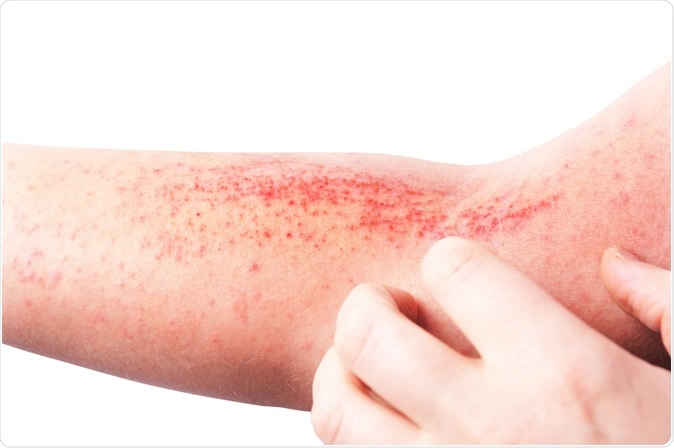Eczema or atopic dermatitis is a skin condition that causes the skin to become itchy, red, and dry due to inflammation. Most commonly found in babies and children, previous recommendations say that daily moisturizer use is crucial in preventing eczema bouts. However, a new study, published in The Lancet, has shown that there is no evidence that daily emollient or moisturizer use during the first year of life prevents eczema.

Atopic dermatitis (AD), also known as atopic eczema. This study shows that families with eczema, asthma, or allergic rhinitis should not use daily emollients to try and prevent eczema in their newborns. Image Credit: LIAL / Shutterstock
A team of researchers from the University of Nottingham wanted to test whether the daily use of moisturizers in the first year of life could prevent eczema in high-risk children. In the past, it is known that a faulty skin barrier is a driver in developing eczema and moisturizers improve skin barrier function by covering the epidermis or the outermost layer of the skin and trapping water to restore moisture.
Most healthcare workers recommend to parents the regular use of moisturizers to prevent eczema in newborn babies, especially those who are at high risk of having the condition since it runs in the family.
"Much progress has been made in recent years on the treatment of severe eczema, but the goal of preventing eczema from developing in the first place remains elusive. Other small studies suggested that moisturizers from birth might prevent eczema, and we were surprised when our large study showed no effect at all," Professor Hywel Williams, a dermatologist at the University of Nottingham and lead author said.
No evidence of efficacy
Babies are regularly treated with skin cream or moisturizers to prevent eczema, but the researchers in the study have found that no evidence moisturizing the skin helps prevent the condition, which affects about 5 to 30 percent of children.
To arrive at their findings, the researchers enrolled more than 1,300 newborn babies who have a history of eczema, hay fever, and asthma in their families. The researchers divided the newborns into two groups – one group had their parents advised to apply moisturizers all over the baby's body every day until their first birthday, and the other group was advised not to use moisturizers. The groups were provided with general skin care guidance.
At the end of the study period, the researchers found that no evidence using moisturizers daily prevented eczema bouts, especially in high-risk infants. Further, there was a small increase in the risk of skin infections, and the daily use of these creams was tied to an increased risk of food allergy.
"We found no evidence that daily emollient during the first year of life prevent eczema in high-risk children and some evidence to suggest an increased risk of skin infections. Our study shows that families with eczema, asthma, or allergic rhinitis should not use daily emollients to try and prevent eczema in their newborn," the researchers concluded in the study.
"While this is disappointing for sufferers who thought that was an option for their children, we can now recommend that this advice is not given to parents and begin looking at what other possible preventative options there may be. It is important not to confuse our study on moisturizers for eczema prevention with the use of moisturizers for people who have eczema, where the evidence of benefit is much greater," Professor Hywel Williams added.
What is eczema?
Eczema or atopic dermatitis is a non-contagious inflammatory condition characterized by dry and itchy skin. People with eczema, especially infants and young children, are prone to bacterial, fungal, and viral skin infections.
An estimated 30 percent of the U.S. population, mostly children and teens, have eczema. Globally, eczema affects about one in five children. The condition typically starts in infancy and may continue until adulthood. Also, people with eczema are susceptible to developing other atopic conditions such as asthma, allergies, and allergic rhinitis.
Experts have linked eczema to the loss of function mutations in FLG, the gene encoding filaggrin, which is a multi-functional protein contributing to skin barrier integrity. When this happens, eczema-stricken people may have impaired skin barrier.
Source:
National Institute of Allergy and Infectious Diseases. (2020). Eczema (Atopic Dermatitis). https://www.niaid.nih.gov/diseases-conditions/eczema-atopic-dermatitis
Journal reference:
Chalmers, J., Haines, R., Bradshaw, L., Montgomery, A., Thomas, K., Brown, S., et al. (2020). Daily emollient during infancy for the prevention of eczema: the BEEP randomized controlled trial. The Lancet. https://www.thelancet.com/journals/lancet/article/PIIS0140-6736(19)32984-8/fulltext